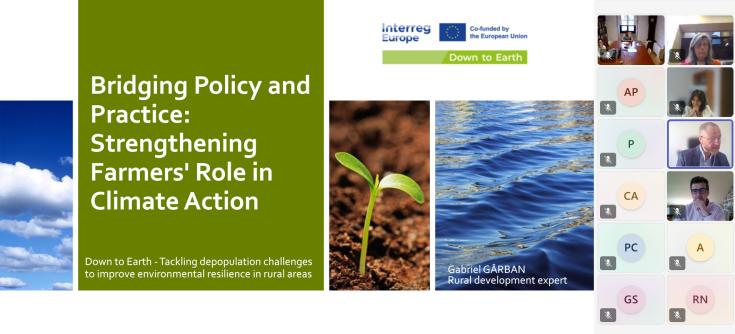Third Digital Workshop with Experts!

On April 29th 2025, Down to Earth partner Fundación Juana de Vega organised the third Digital Workshop with Experts, which covered the topic of Year 3: Policy instruments to foster the role of farmers and land managers in fighting climate change and environmental risks. The workshop counted with the presence of Mr. Gabriel Gârban, expert in rural development and agricultural policy, who discussed on the topic with project partners.
The workshop, named "Bridging Policy and Practice: Strengthening Farmers' Role in Climate Action", began with a comprehensive overview of climate change’s impact on agriculture —not only on rural landscapes, but also on crops, agricultural soils, food production and productivity, biodiversity, and economic prospects. While farming activities contribute approximately 10-12% of global greenhouse gas emissions, Mr. Gârban stressed that agriculture is not solely a source of emissions: it also holds significant potential for climate change mitigation through carbon sequestration and sustainable land management. In this sense, engaging farmers in sustainable practices (both for mitigation and for adaptation) turns out to be essential for building environmental resilience. As such, farmers become key agents of climate action, and agricultural policies should focus on empowering them to take on this role.
The presentation then shifted to a brief review of the European Union's key adaptation strategies, policies, and instruments addressing these challenges. Most notably the Soil Strategy for 2030, and the Water Framework Directive, together with frameworks such as the Green Deal, and the Farm to Fork Strategy. Mr. Gârban underscored the importance of aligning agricultural policies with broader climate action efforts, while recognizing that effective solutions must account for regional differences. Contextual variations require context-specific tools, and regional challenges demand tailored strategies that directly address local needs. Further on, Mr. Gârban examined local and regional policies of EU member states on the topic, and presented successful policy implementation cases of other regions, such as the United States and India.

Assessing existing policies is critical for identifying challenges, obstacles and bottlenecks in addressing climate change and mitigating its impacts. Such assessments also help refine strategies that support and enhance the role of farmers and land managers in climate action. Our expert then provided a detailed set of recommendations on how to effectively identify regional policy issues, along with practical guidance for conducting thorough and accurate regional thematic analyses.

The presentation was followed by a Q&A session, during which participants posed questions and exchanged views on some of the main takeaways of Mr. Gârban's exposition. The discussion highlighted the need for collaboration between different administrative levels and sectors, including direct involvement from farmers. In short, stakeholder engagement was identified as a critical factor in both policy development and implementation. The importance of policy coordination was also emphazised. In addressing these points, our expert shared additional insights from existing case studies that illustrate successful examples of implementation.

In sum, the exchange highlighted the critical role of cooperation between policymakers, agricultural producers, farmers and other local stakeholders in addressing climate change's effects. The engagement of land managers and farmers in the policy development and implementation processes also proves to be essential in fostering their role in that fight. This entails building trust, promoting knowledge exchange, supporting farmer-led innovations, and fostering co-creation processes. Building on the outcomes of this workshop, Down to Earth partners are now preparing for a new series of Regional Stakeholder Meetings, where they will engage with local actors to explore the topic further and begin drafting their Regional Reports.
